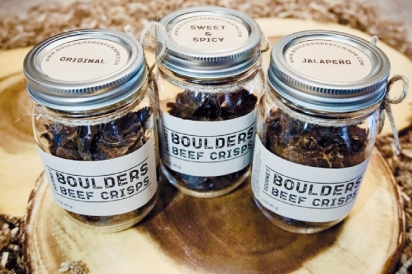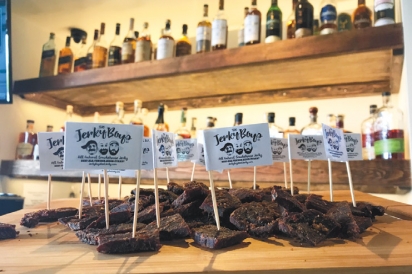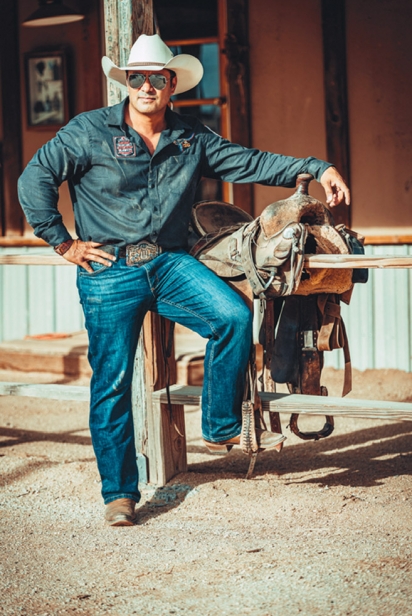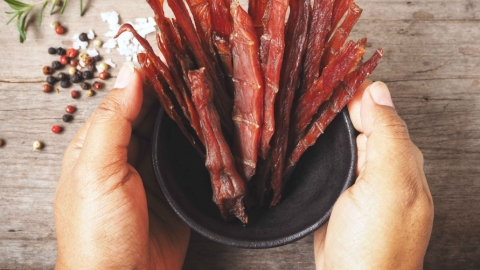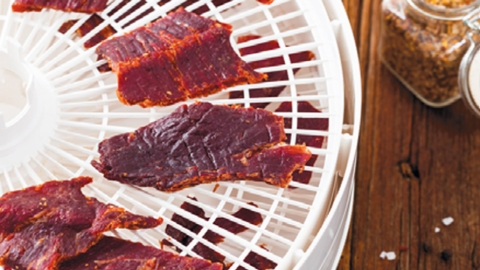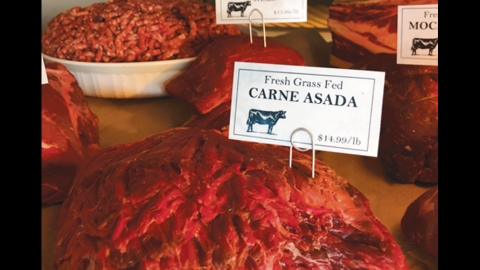Jerky: From Lowbrow Convenience Food to Artisanal Health Snack
No longer limited to the vest pockets of hunters or the consoles of cars on cross-country road trips, jerky has become a modern-day health food. It’s lean and full of protein, and it’s the go-to post-workout snack for many CrossFitters and Paleo and Keto enthusiasts. It’s still ubiquitous in convenience stores and gas stations, but now you can find artisanal versions in the finest grocery stores and at farmers markets.
Even as plant-based, ersatz meat products have exploded on the scene, real meat snacks have proliferated, and jerky is one of the most popular. Why? It can be an affordable, simple comfort food, and a new generation of makers is acquiescing to health-conscious consumers’ desires for better snacks by eliminating excess salt, sugar and preservatives.
Jerky is hardly a new concept. Dried meats have been around since humans first started hunting wild game, and most cultures prepare some form of meat by slicing, saltcuring and drying. In China, it’s bakkwa; in South Africa, biltong; in Turkey, pastirma; and in Italy, bresaola. The word “jerky” actually comes from the Andes: In the Quechua language, the word for dried meat is ch’arki, and in the Andean countries of South America, it’s made from llama, alpaca or sometimes beef.
According to several market research firms, almost 130 million Americans claim to have eaten meat snacks in 2018, and the preponderance of that was jerky. Convenience store sales of jerky in 2018 totaled more than $450 million. It’s become such a hot trend that in 2015, chocolate maker Hershey paid between $200 and $300 million for Krave, a small artisanal jerky company in Sonoma, California. It’s no wonder, then, that several Arizona entrepreneurs have jumped into the burgeoning jerky market.
Boulders Gourmet Beef Crisps
Laura Onofrei; her husband, Michael; and brother, Adrian Ban, started making jerky as a family hobby three years ago. Knowing her husband was a big fan of jerky, Onofrei bought him a dehydrator for an anniversary gift. The three of them started experimenting with recipes, but it was a culinary mistake that led them to turn their hobby into a business. One day they accidentally sliced the meat too thin, but, she says, “after we tasted it, we were amazed by the taste and the texture. It was basically beef jerky in chip form, so it wasn’t chewy and hard to eat like traditional beef jerky, but crispy, thin and packed with flavor. We couldn’t stop eating it.” They realized they had something that might change people’s snack habits, and that’s when Boulders Gourmet Beef Crisps was born.
Onofrei says two qualities set their product apart from other jerky on the market. The first is the paper-thin texture, which is easy for anyone to eat, unlike the tooth-wrenching toughness of some thick-sliced products. The second is the intensity of the flavor. Onofrei points out that in the jalapeño version, you’ll find little bits of chile on the surface of the chips. The team also believes that jerky can be a snack any time, even after dinner, so they created sweet and savory versions drizzled in white and dark chocolate. She says it’s the perfect combination of sweet and salty. “We have people that come and ask specifically for that flavor.”
Because the business is just over a year old, Onofrei says she and her partners are praying for guidance as they contemplate expansion. “People have responded to this new form of beef jerky very well, so we have hopes for the future,” she says. In the meantime, they’ll be at the Uptown Farmers Market in Phoenix and the Park West market in Peoria every Saturday.
The Jerky Boys
The Jerky Boys, Inc., is another Valley company with an unusual spin on the traditional product. According to partner Landon Evans, their jerky is made from ground meats and then smoked for eight hours over Jack Daniel’s wood chips, rather than dehydrated. “The ground product offers a much more moist, savory aftertaste,” he says. “People are amazed jerky can taste like filet mignon.” He adds that people are generally expecting something different when they see beef jerky, so they’re surprised that Jerky Boys is melt-in-the-mouth tender.
Like the Onofreis, the business started as a hobby for Evans, his dad and his brother. They were making the dehydrated version for friends and family when, in 2016, they bought a used mobile smoking unit. They began perfecting their recipes and then aligned with a copacker in Phoenix who was able to take the products into mass production. That led to a distribution agreement, and now jerky lovers can find Jerky Boys products all over Arizona: everywhere from Ace Hardware stores to shooting ranges, gas stations and even resort hotels.
Evans stresses that the company’s jerky has no soy or nitrates. The biggest seller is the regular-flavored bison, but the habanero beef and peppered beef are right behind. The company also makes elk, venison and turkey versions. Evans says he has no plans to expand the flavors or meat varieties, but they are in negotiations with a company to buy root beer barrels to turn into chips for smoking. That could turn into a special-label product.
Santana’s Black Label Jerky
Unlike food artisans who started with a hobby that grew into a business, Louis Santana of Glendale was a corporate executive who had never eaten a stick of jerky in his life. “It just wasn’t on my radar,” he says. “I would never go into a convenience store and say, ‘Hey, I need some jerky.’ I just wasn’t that guy.”
He was, however, a dad to two young kids who were feeling the loss of his presence because of his business travel. He was up for a promotion, but he missed having time to spend with them, too. It was his daughter who pointed out that he never took them to the park anymore, and with his new position, that wasn’t going to change. Santana started reevaluating his career path. One night, he had a dream about jerky. The next morning, he used the formula in his dream to make five pounds and sent it to work with a friend who officed in a medical building. He spent the next two weeks making jerky for people in the building. It was such a hit, he knew he was on to something, so at the end of the two weeks, he left his six-figure job to go all in with jerky.
Santana’s Black Label Jerky is made from Angus beef in the company’s own plant in New Mexico, and is distributed in seven states, including Arizona. Santana says his recipes avoid excess salt, high-fructose corn syrup, soy and MSG, but his main secret is in the painstaking process they use to develop their flavors. The green chile, for example, is made with fresh roasted Hatch green chiles, rather than powder. “To me, it’s always about the nuance of flavor,” he says. “You can make a product, but can you make a product dance? Can you make a product sing? Can you make it ‘wow!’? That’s where I love the challenge.”
Santana launched with a slim marketing budget, but the company has built a social media presence on Facebook and Instagram and runs The Black Label Tour, weekends spent at various special events like music festivals and rodeos throughout the Southwest where Santana and his team can interact with and build repeat customers. The business has been successful in its four years of existence, and to ensure long-term sustainability, Santana has added new product lines. Cocktail mixes and barbecue sauces are the first, and he anticipates others, like hot sauce, to come. In addition to high-end convenience stores, Albertson’s, Safeway, Basha’s and Total Wine will soon be carrying Santana’s products.
Hand-crafted jerky isn’t inexpensive. Most retail for between three and five dollars an ounce, unlike the mass-produced versions that are around a dollar. But for people looking for a healthier, tastier local product, price doesn’t seem to be an issue. After all, it is still a snack.



